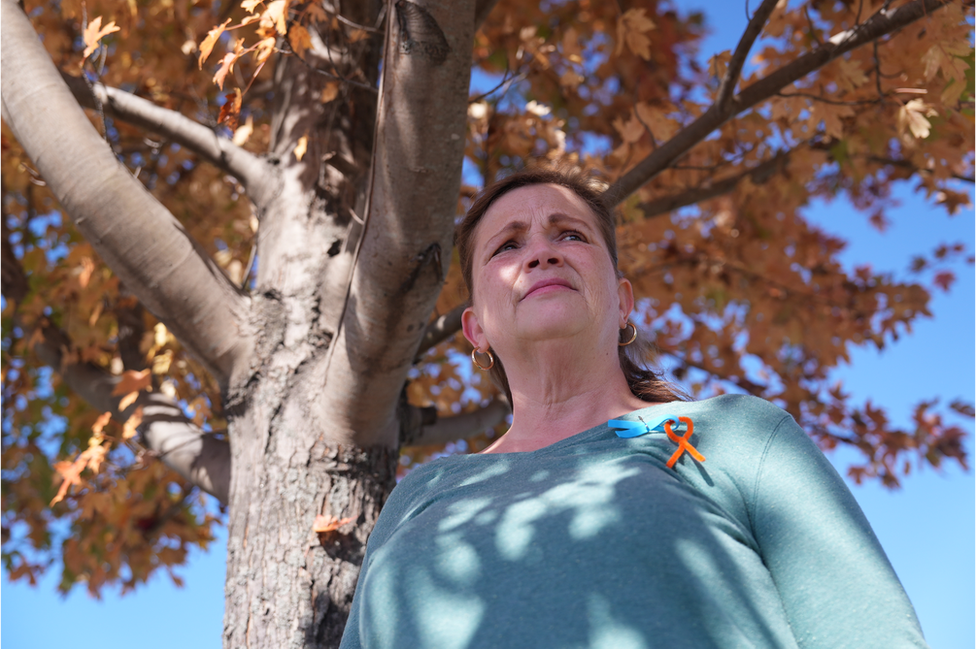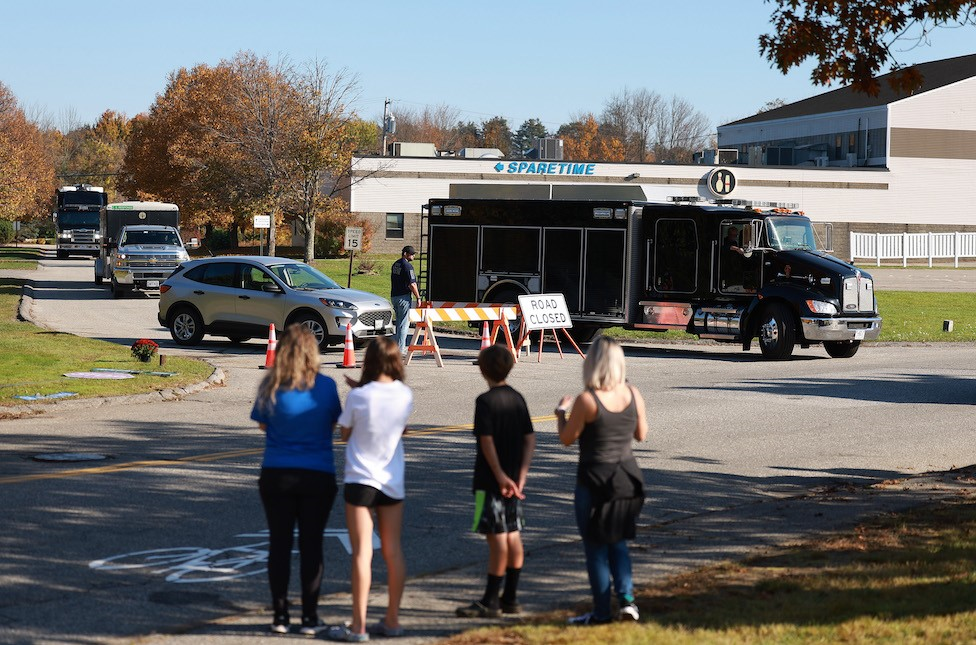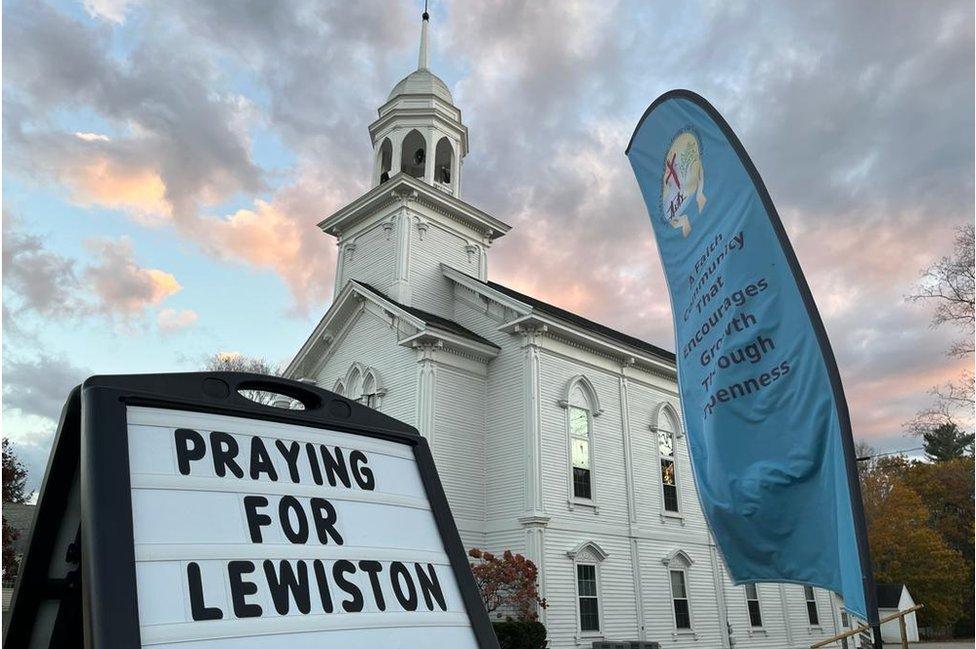Tears and relief in Maine after gunman's death
- Published

Jen Earle phoned her daughter and they cried with relief
For 48 hours, the city of Lewiston in Maine has been on edge as the man accused of fatally shooting 18 people in a bar and a bowling alley was being hunted down. Now the news of his death has released a flood of emotions.
When reports first emerged that the suspect's body had been found, Jen Earle was at work.
Mixing drinks and clearing tables at a hotel bar along the state's coast, the 52-year-old lifelong Maine resident saw a bright, red banner flashing across the flat screen TV hanging above the bar.
Ms Earle, visibly overcome, just clapped.
She went outside to call her daughter, a former employee of Schemengees Bar and Grille, one of the sites of the shooting, and the two cried tears of relief.
Soon after, Maine's governor appeared on the television, the volume now turned all the way up, to say the body of the suspect, Robert Card, 40, had been found in Lisbon, near to where the shooting had occurred.
Police later said he was found with a self-inflicted gunshot wound in a trailer near a recycling centre where he used to work - a location that had already been searched twice by police.
Hundreds of state and local officers had scoured the area by land, water and sky, in a massive search that had kept thousands of people under lockdown.
Even miles outside the perimeter, many businesses in Maine's south opted for a self-imposed shutdown, casting an eerie pallor over the state.
Watch: 'We sold 28 guns yesterday' - Lewiston gun shop owner
In statements, Maine officials expressed their gratitude that the suspect no longer posed a threat.
"It will take a long, long time to process this pain, but Maine people have grit, resolve and heart and we will come together through this difficult grieving period and hope for brighter, calmer days," said Senator Angus King in a statement.
And in Lewiston on Saturday, sunny and uncharacteristically warm, the relief was palpable.
"Look around, this is a beautiful Saturday in October, people are getting out," said Sean Gosselin from a local shopping centre, residents milling around him pushing carts filled with shopping, others lining up at a nearby cafe.
But there was also a change, Mr Gosselin said, pointing to a police vehicle stationed in the parking lot. "You wouldn't see a police car here, normally," he said.

Locals watch police leave the site of one of the shootings
While a feeling of widespread fear has begun to recede, residents said they are left with devastating grief over the 18 people murdered this week, a sudden and shocking blow to a state that typically records around two dozen homicides in total each year.
The ages of the victims ranged from 14 to 76 years old. The youngest, Aaron Young, was there with his father, William, who was also killed.
Maine's deaf and hard of hearing community was especially hard hit, with four members of a deaf cornhole team killed at Schemengees, with another two injured.
"Our community is shattered, that is the word that keeps coming to my mind," said Dr Karen Hopkins, executive director of the Maine Educational Centre of the Deaf. The four deaf men who were killed, Joshua Seal, 36; Billy Brackett, 48; Steve Vozella, 45; and Bryan MacFarlane, 41, "were connected in many different ways to our community", she said.
At an online vigil held by the deaf community, nearly 100 people from across the country spoke and signed about their immense sadness, sharing stories about all four men.
"When I say this loss is big, I mean it is immeasurable," said Terry Morrell, director of the state's deaf and hard of hearing department. "It's difficult to accept, I don't know that we ever will."

Towns nearby express their solidarity
Indeed, many residents said they were struggling to digest this new reality, one scarred by gun violence.
And in Lewiston, some residents have already turned to guns themselves as a source of potential safety, deciding to arm themselves against potential threats.
At his downtown gun store, owner Daniel Brooks told the BBC he sold around 28 guns on Friday. Normally, he said, he sells between two and four. Of all Friday's purchases, half were first-time buyers.
The news did not surprise Ms Earle. "I guarantee there's going to be an uptick in gun sales here," she said.
Her daughter, who works with her son at Sliders Sports Pub in Lewiston, told Ms Earle she would not return to work without a gun, suddenly desperate to protect herself.
"We thought we were this safe little place in Maine," Ms Earle said. "You see the news of the shootings, all the mass casualties but you think 'it's not going to happen here, we don't have that kind of problem. Now we do."
Additional reporting by Mike Wendling